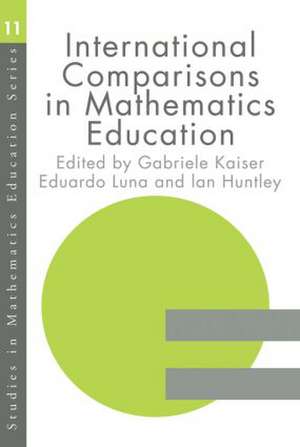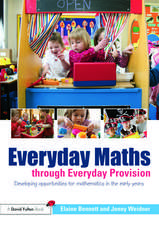International Comparisons in Mathematics Education
Autor Ian Huntly, Gabriele Kaiser, Eduardo Lunaen Limba Engleză Paperback – 11 noi 1998
| Toate formatele și edițiile | Preț | Express |
|---|---|---|
| Paperback (1) | 458.64 lei 6-8 săpt. | |
| Taylor & Francis – 11 noi 1998 | 458.64 lei 6-8 săpt. | |
| Hardback (1) | 1277.45 lei 6-8 săpt. | |
| Taylor & Francis – 11 noi 1998 | 1277.45 lei 6-8 săpt. |
Preț: 458.64 lei
Nou
Puncte Express: 688
Preț estimativ în valută:
87.79€ • 95.39$ • 73.79£
87.79€ • 95.39$ • 73.79£
Carte tipărită la comandă
Livrare economică 21 aprilie-05 mai
Preluare comenzi: 021 569.72.76
Specificații
ISBN-13: 9780750709026
ISBN-10: 0750709022
Pagini: 280
Dimensiuni: 156 x 234 x 14 mm
Greutate: 0.52 kg
Ediția:1
Editura: Taylor & Francis
Colecția Routledge
Locul publicării:Oxford, United Kingdom
ISBN-10: 0750709022
Pagini: 280
Dimensiuni: 156 x 234 x 14 mm
Greutate: 0.52 kg
Ediția:1
Editura: Taylor & Francis
Colecția Routledge
Locul publicării:Oxford, United Kingdom
Public țintă
Postgraduate and ProfessionalRecenzii
'International Comparisons in Mathematical Education provides a sensible perspective on a complex problem, describing the work of TIMSS (the Institute of Economic Affairs' Third International Mathematics and Science Study).' - Times Educational Supplement
Cuprins
Chapter 1 International Comparisons in Mathematics Education Under the Perspective of Comparative Education, Gabriele Kaiser; Part 1 Recent International Comparative Studies in Mathematics Education; Chapter 2 The Second International Mathematics Study, Kenneth J. Travers, Avrum I. Weinzweig; Chapter 3 An Overview of the Third International Mathematics and Science Study, Albert E. Beaton, David F. Robitaille; Chapter 4 Explaining TIMSS Mathematics Achievement, Curtis C. McKnight, Gilbert A. Valverde; Chapter 5 An Examination of Instructional Practices in Six Countries, Leland S. Cogan, William H. Schmidt; Chapter 6 Studying Mathematics Classrooms in Germany, Japan and the United States, Takako Kawanaka, James W. Stigler, James Hiebert; Chapter 7 The Case Study Project of TIMSS, Harold W. Stevenson; Chapter 8 Some Findings of the US-Japan Cross-cultural Research on Students’ Problem-solving Behaviours, Jerry P. Becker, Toshio Sawada, Yoshinori Shimizu; Chapter 9 Comparative Studies on Teaching Mathematics in England and Germany, Gabriele Kaiser; Chapter 10 Applications of Arithmetic in US and Chinese Textbooks, Lianghuo Fan; Part 2 What Can We Learn from International Comparative Studies in Mathematics Education?; Chapter 11 The Value of Comparative Studies, Geoffrey Howson; Chapter 12 School Mathematics, Thomas A. Romberg; Chapter 13 International Benchmarking as a Way to Improve School Mathematics Achievement in the Era of Globalization, Bienvenido F. Nebres; Chapter 14 Gender Differences in Mathematics Achievement—Here Today and Gone Tomorrow?, Gilah C. Leder, Christine Brew, Glenn Rowley; Chapter 15 Measurement Obstacles to International Comparisons and the Need for Regional Design and Analysis in Mathematics Surveys, Richard G. Wolfe; Chapter 16 The Rationality and Irrationality of International Comparative Studies, Christine Keitel, Jeremy Kilpatrick;
Notă biografică
Gabriele Kaiser, Eduardo Luna, Ian, Huntley
Descriere
This text explores international comparisons in mathematics education and highlights strengths and weaknesses in various systems world-wide, allowing teachers, researchers and academics to compare and contrast different approaches.














